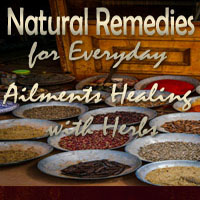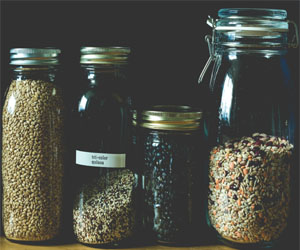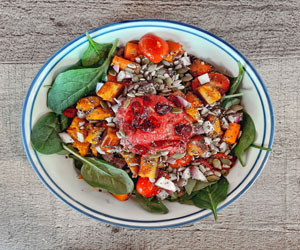


A Journey To Better Health And Taste

Wholesome ingredients are the foundation of a healthy and delicious diet. These are the foods that not only nourish our bodies but also delight our taste buds. Whether you're a seasoned chef or just starting to explore the world of cooking, understanding the importance of wholesome ingredients can elevate your culinary experiences and contribute to your overall well-being. In this article, we'll explore what makes ingredients "wholesome" and why they are worth embracing.
1. What Are Wholesome Ingredients?
Wholesome ingredients are those that are minimally processed and as close to their natural state as possible. They are rich in essential nutrients, including vitamins, minerals, fiber, and antioxidants, and are free from additives, artificial flavorings, and excessive amounts of sugar, salt, and unhealthy fats.
2. Fresh Fruits And Vegetables: At the heart of any diet based on wholesome ingredients are fresh fruits and vegetables. These colorful and nutrient-dense foods provide a wide array of vitamins and minerals, along with dietary fiber. Incorporating a variety of fruits and vegetables into your meals ensures you get a broad spectrum of nutrients.
3. Whole Grains: Whole grains, such as brown rice, quinoa, oats, and whole wheat, are unrefined grains that retain all parts of the grain kernel. They are a rich source of fiber and provide a steady release of energy. Whole grains are a staple in a wholesome diet.
4. Lean Proteins: Lean proteins like chicken, turkey, fish, tofu, legumes, and low-fat dairy products are essential for muscle health and overall well-being. They are a primary source of amino acids necessary for the body's growth and repair.
5. Healthy Fats: Wholesome ingredients include healthy fats like avocados, nuts, seeds, and olive oil. These fats provide essential fatty acids that support various bodily functions, from brain health to skin and hair.
6. Natural Sweeteners: When sweetness is desired, wholesome ingredients offer natural sweeteners such as honey, maple syrup, and dates. They provide a sweet taste without the refined sugars often found in processed foods.
7. Minimal Processing: Wholesome ingredients are as close to their natural state as possible. They have undergone minimal processing and do not contain artificial additives or preservatives. This ensures that the nutrients and flavors are retained.
8. Flavorful Herbs And Spices: Herbs and spices, like basil, oregano, cinnamon, and turmeric, are key components of wholesome ingredients. They not only enhance the taste of your dishes but also offer various health benefits, such as anti-inflammatory properties.
9. Ethical And Sustainable Choices: Embracing wholesome ingredients goes beyond nutrition. It also involves considering the environmental and ethical aspects of your food choices. Supporting sustainable and ethical farming practices can contribute to a healthier planet and a better future.
10. Improved Well-Being: Choosing wholesome ingredients can lead to better health, improved energy levels, and a reduced risk of chronic diseases. Moreover, wholesome ingredients can have a positive impact on mood and mental well-being, making you feel better both physically and emotionally.
Embracing wholesome ingredients is a journey towards better health and taste. These foods are not only nutritious but also bursting with flavors and textures that can transform your meals into culinary delights. By incorporating fresh fruits and vegetables, whole grains, lean proteins, healthy fats, and flavorful herbs and spices into your diet, you can nourish your body, elevate your cooking, and enhance your overall well-being. Whether you're crafting a gourmet meal or preparing a simple dish, choosing wholesome ingredients is a rewarding choice that benefits both you and the planet.
Nature's Soothing Elixir
 The Science Of Aromatherapy
The Science Of Aromatherapy
Aromatherapy, the practice of using essential oils for therapeutic purposes, capitalizes on the connection between our sense of smell and the brain's limbic system, which governs our emotions. The aromatic compounds in essential oils can influence our mood, emotions, and even our physical well-being.
Stress Reduction: A Holistic Approach
Stress affects us on multiple levels, and a holistic approach to its reduction is essential. Essential oils can address the interconnected aspects of stress, providing relief on both emotional and physical levels.
Emotional Stress Relief
One of the most well-known benefits of essential oils is their ability to alleviate emotional stress. Oils like lavender, chamomile, and rose can have a calming and soothing effect on the mind. Inhaling these fragrances or using them in massages can help reduce anxiety, lower stress levels, and promote a sense of well-being.
Physical Stress Relief
Stress often manifests physically, leading to muscle tension, headaches, and other discomforts. Essential oils like eucalyptus, peppermint, and ginger are valuable allies in relieving physical stress. They can be applied topically, diluted in carrier oils, or added to bath water to ease muscle tension and reduce headaches.


Satisfying Your Hunger In A Hurry
 The Need For Quick Meals
The Need For Quick Meals
Quick meals are a necessity for many people. Whether you're a busy professional, a student with a tight schedule, or a parent juggling multiple responsibilities, there are moments when you need a meal that's ready in a flash. Fast-food options can be tempting, but they often lack nutritional value and can contribute to health issues over time.
Balancing Speed And Nutrition
The key to successful quick meals lies in finding a balance between speed and nutrition. While it's true that some convenience foods are laden with preservatives and unhealthy additives, many options prioritize health and taste. Pre-packaged salads, lean protein options, and microwaveable whole-grain dishes are just a few examples of quick meals that offer a healthier alternative to traditional fast food.
Home-Cooked Quick Meals
Cooking at home doesn't always mean spending hours in the kitchen. With the right ingredients and recipes, you can prepare a delicious and nutritious meal in no time. Here are some ideas for quick home-cooked meals:
A Lifelong Journey To Wellness
 Sustainability: Short-term solutions and crash diets often result in temporary improvements, followed by relapses. Long-term health is sustainable, promoting consistent well-being that lasts a lifetime.
Sustainability: Short-term solutions and crash diets often result in temporary improvements, followed by relapses. Long-term health is sustainable, promoting consistent well-being that lasts a lifetime.
Quality Of Life: Long-term health is not just about living longer but living better. It ensures that you can enjoy life to the fullest, with the physical and mental vitality to pursue your interests and passions.
Reduced Healthcare Costs: By investing in long-term health, you can potentially reduce healthcare costs associated with the treatment of chronic illnesses, doctor visits, and medications.
Investing In Long-Term Health
Balanced Diet: A diet rich in nutrient-dense foods is the foundation of long-term health. Emphasize fruits, vegetables, whole grains, lean proteins, and healthy fats. Minimize processed foods, added sugars, and excessive salt.
Regular Physical Activity: Incorporate regular exercise into your routine. Engage in a mix of aerobic, strength, and flexibility exercises to promote overall physical well-being.
Mental Health: Prioritize your mental health by managing stress, practicing mindfulness, and seeking support when needed. Mental well-being is as crucial as physical health for long-term wellness.
Preventive Healthcare: Schedule regular check-ups and screenings to catch potential health issues early. Preventive healthcare measures can help you address concerns before they become significant problems.
Sleep And Rest: Ensure you get sufficient quality sleep, as restorative rest is crucial for overall well-being. Maintain a consistent sleep schedule to support your body's natural rhythms.
Social Connections: Nurture meaningful relationships with friends and family. Social connections are essential for emotional well-being and provide a support system for life's challenges.






The Key To A Balanced Diet And Healthy Eating
 Understanding Portion Control
Understanding Portion Control
Portion control involves being mindful of the quantity of food you eat during a meal or snack. It's not about depriving yourself but rather about ensuring that you consume a suitable amount of nutrients while avoiding excessive caloric intake. Proper portion control helps you better manage your caloric intake, which is crucial for weight management and overall health.
The Importance Of Portion Control
Weight Management: One of the primary benefits of portion control is its role in weight management. Consuming smaller, balanced portions can help prevent overeating, which is often a significant contributor to weight gain and obesity.
Balanced Nutrition: Portion control encourages a balanced intake of nutrients. It ensures that you get a variety of foods in appropriate amounts, which is essential for overall health and well-being.
Digestive Health: Eating moderate portions can alleviate digestive discomfort and prevent issues like indigestion, bloating, and heartburn.
Blood Sugar Control: Portion control can help stabilize blood sugar levels, making it a valuable strategy for individuals with diabetes or those at risk of developing the condition.
Mindful Eating: It encourages mindful eating, a practice that promotes greater awareness of hunger and fullness cues, reducing the likelihood of emotional or overindulgent eating.
Practical Portion Control Strategies
Use Measuring Tools: Utilize measuring cups, kitchen scales, and portion control plates to accurately measure your food servings.
 Mindfulness Meditation: One of the most effective ways to find tranquility is through mindfulness meditation. This ancient practice encourages individuals to be fully present in the moment, without judgment. By focusing on their breath and observing their thoughts and emotions, people can achieve a state of calm and serenity. Even just a few minutes of mindfulness meditation each day can provide a sense of tranquility and a break from the daily hustle.
Mindfulness Meditation: One of the most effective ways to find tranquility is through mindfulness meditation. This ancient practice encourages individuals to be fully present in the moment, without judgment. By focusing on their breath and observing their thoughts and emotions, people can achieve a state of calm and serenity. Even just a few minutes of mindfulness meditation each day can provide a sense of tranquility and a break from the daily hustle.
Nature Retreats: Nature has a remarkable ability to soothe the mind and replenish the soul. Taking a break from the stress-filled world to spend time in nature can be a profound source of tranquility. Whether it's a walk in the woods, a day at the beach, or simply sitting in a park, connecting with nature can offer a sense of peace that is hard to find elsewhere.
Digital Detox: The constant connectivity to technology can be a significant source of stress. Taking time for a digital detox, where you disconnect from your devices and immerse yourself in the offline world, can be a refreshing way to find tranquility. It allows you to be fully present in your surroundings and engage in meaningful, real-world interactions.
Simplicity And Minimalism: Sometimes, simplifying your life and embracing minimalism can lead to tranquility. Reducing clutter in your physical space and streamlining your commitments can create a sense of calm. It allows you to focus on what truly matters, eliminating unnecessary stressors.
Yoga And Breathwork: Yoga combines physical movement with breath control, promoting relaxation and inner peace. It not only improves physical flexibility but also calms the mind. Incorporating yoga and breathwork into your routine can help you find tranquility in the midst of chaos.
Art And Creativity: Engaging in creative activities such as art, writing, or music can be therapeutic. These activities offer an escape from the stress-filled world, allowing you to express your emotions and find tranquility through creative self-expression.